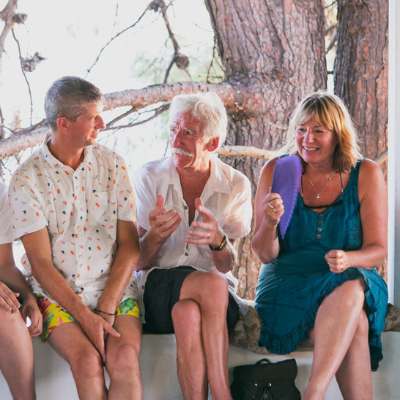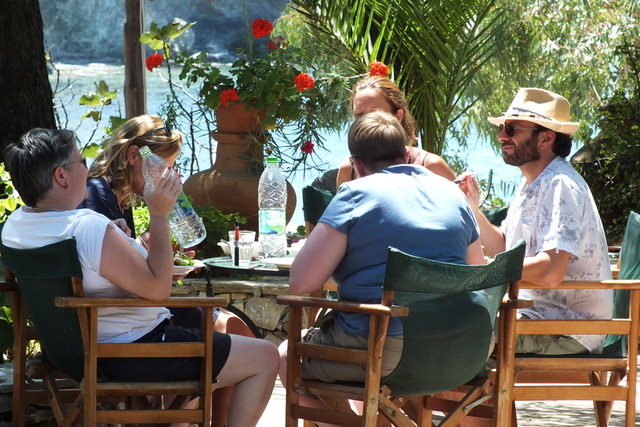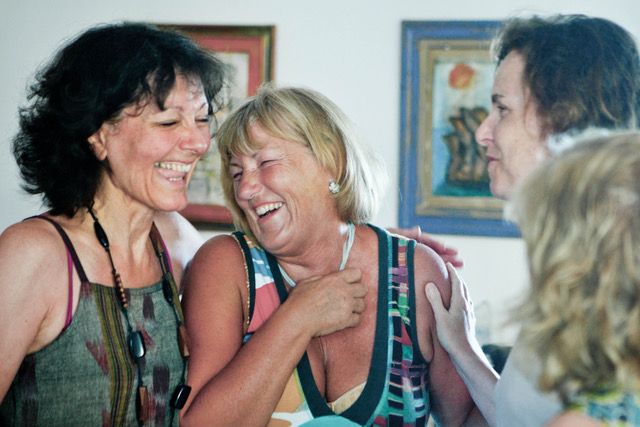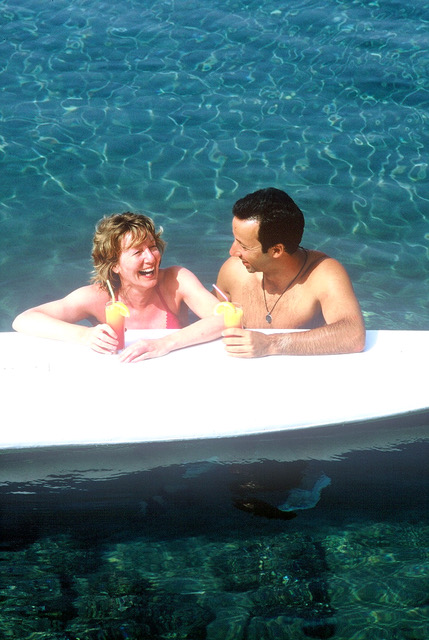Skyros Blog

Home to everyone who looks for friendship, intimacy and support
Simple lines of communication between people, support in their drive to fulfill their potential and help to revitalise the community and bring back our sense of common purpose
Œkos in Greek stands for home/family – the words economy and ecology derive partly from it. In our, the Skyros context œkos means ‘family’ group, the temporary home base of like-minded people. Safe, warm and intimate, it’s there to provide simple lines of communication between people, support the drive of its members to fulfill their potential and help revitalise the community and bring back our sense of common purpose.
Œkos is about both inner and outer change. They are the two sides of the same coin, for the discomforts of our time are as much ill-effects of our social values as the latter are ill-effects of our individual perceptions.
The idea is underpinned by an alternative value system which places the emphasis on being rather than having, doing rather than consuming, cooperating rather than competing and caring rather than being indifferent or cynical. Its holistic approach to life aims to acknowledge all our needs – intellectual, social, emotional, spiritual and physical – that needs to become more free, just and safe.
An œkos group can do very well in Atsitsa’s Apricot circle, but an œkos network can also be established in the neighborhood, the college or the workplace. The idea is simple. A group of six to twelve people get together with a commitment to communicate with each other openly and honestly. The meetings begin with a ‘round’ in which members take 3-5 minutes each to speak from their heart about where they are at this moment in their life. The space is then open for feedback, discussion, exchange of ideas and planning of activities on whatever level the group feels committed to.
Fully autonomous, the groups determine their own flavour, range of interests, and scope of activities. They are open to everyone who shares their values and objectives.
Intimacy
Œkos is rooted in Atsitsa, Skyros island, where it grew and developed. Originally known as the UFO group, it was the forum to which people b rought anything they couldn’t raise anywhere else: a memory, a discovery, a difficulty, an idea. Though loosely defined, œkos soon became an oasis of intimacy. People could share in it feelings and thoughts in a way many had never done before. They were enabled to establish the kind of effective communication that transcended age, class, sex, race, professional and other cultural biases. Relatively free from the distorting effects of other people’s projections, they opened up and flourished beyond even their own comprehension.
rought anything they couldn’t raise anywhere else: a memory, a discovery, a difficulty, an idea. Though loosely defined, œkos soon became an oasis of intimacy. People could share in it feelings and thoughts in a way many had never done before. They were enabled to establish the kind of effective communication that transcended age, class, sex, race, professional and other cultural biases. Relatively free from the distorting effects of other people’s projections, they opened up and flourished beyond even their own comprehension.
The resulting trust encouraged spontaneity, playfulness and a freedom that enabled people both to reassess priorities and values and expand personal limits. It also encouraged a camaraderie that gave birth to various good projects later on.
Œkos is fundamentally an idea, a consciousness raising process. People can take from it what they want and discard the rest so long as they observe the initial simple communication and listening. It should therefore be seen as a vehicle of possibilities in what is, in essence, a very open-minded venture.
Œkos is about being and doing something positive with the group’s support. By reversing assumptions made in life as we know it, we can at least just recreate our immediate world. The group can provide the emotional and intellectual stimulation to aim higher in life and even make dreaming once again possible!
Being yourself
To make things work you will need to help as much as possible to establish an open and honest line of communication. Reaching out to understand and tell truth is possible only in an atmosphere where you don’t need to present and prove yourself. All you need is to be yourself in the presence of the others. Don’t be afraid to show your fears and vulnerabilities – we all have them! Don’t pretend you are something you feel you aren’t – you won’t be believed! Don’t hide behind the authority you have earned in your professional life – it won’t work!
Go as far as you feel it’s safe for you. But acknowledge your needs as a person. Take care of yourself, and do also help to make the environment safe for you and everyone else to take risks. Listen, show empathy and give. But be ready to accept support, too.
Trust in other members’ integrity and commitment to truth is a condition for the groups’ existence. The beauty of it is that, once established, trust will not only draw the members of the group to each other; it will also bring out the best in them, which is exactly what we so often in modern life do our best to hide or suppress. Trust cannot be built in a day, but the intention to establish it might be there right from the beginning. Commitment is of equal importance, for there’s no room for cynicism. Cynicism may be the dress contemporary sophistication puts on to impress, but it’s hardly the material with which to build a new world.
Anything goes!
Œkos basically gives time and space to each of its members to explore in the presence of the other members of the group their personal feelings a nd concerns, preoccupations and thoughts. One can air anything that has to do with how he or she relates to his or her own self, to relations or close associates, or to situations, work or otherwise. In fact, anything that has to do with the way we relate to the world we live in goes!
nd concerns, preoccupations and thoughts. One can air anything that has to do with how he or she relates to his or her own self, to relations or close associates, or to situations, work or otherwise. In fact, anything that has to do with the way we relate to the world we live in goes!
Personal issues can easily generate an exchange of views on wider moral, ethical, social and other issues or focus the attention of the group to issues such as parenthood, fashion, sexuality, religion, or New Labour. This is great as long as the discussion is rooted in, and reflects, genuine personal preoccupations – use always ‘I’ rather than ‘one’ – and doesn’t turn the proceedings into a meaningless debate. Bringing personal preoccupations to the attention of the group means we bring in anything associated with life – disappointments, frustrations and pain, but also as joy, hopes, expectations and dreams. Œkos has to be as open to both light shadow as life itself is.
All members of the group commit, of course, themselves to complete confidentiality. Without it, trust can never grow and people will never open up. This doesn’t mean you can’t talk outside the group about your own experience in it, but it is not appropriate to name or identify the members or their concerns in any way that violates the trust they have placed in you.
Diving time
What one decides to talk about is determined by what he or she comes across following a dive into the inner self. Listen attentively to what comes from the inside – from the mind and the heart. It may have to do with ‘my relationship’ or ‘my obligations to this world’, with ‘my low self-esteem’ or ‘the authoritarian structures I find myself in’. On occasion, particular themes could be suggested and explored.
 So, what have you come up with? What is it associated with? How important is it? How do you handle it? Where is it taking you? Can you do anything about it? What?
So, what have you come up with? What is it associated with? How important is it? How do you handle it? Where is it taking you? Can you do anything about it? What?
What is most important is that when you talk about it, you do it in the same way that you would talk to your own self. Think of this not as a communication to others in which you tell them what you know about yourself but they don’t know, but rather a communication to yourself in which you discover what you didn’t know until it popped out.
Remember: You’re not delivering a speech; you’re not trying to impress anyone; you’re not there to mislead others and ultimately your own self, you’re face to face with your own truth. Accessing inner thoughts and the gut feeling underneath can help you answer the ultimate question: what does or would make me really happy? – on which way we relate to the outside world depends.
The answer may massively challenge our personal priorities and values, and open the way towards a new life, more balanced and fulfilled, closer to the roots of our existence. It’s also bound to question the values and the structures of the world we live in.
Commitment
Œkos is not easy to create or maintain. It’s nature runs against the grain of our society’s ethos and it’s individualistic culture. We are used to seeing in people the professional colleagues, the clients, the neighbors and we relate to them accordingly; our human saide is labeled ‘private life’ and locked away in the basement never to be aired.
To make œkos work requires, as does any relationship, patience and wisdom, concern, compassion and love. Of course, what you get out of it depends absolutely on what you put in. Things don’t happen on their own! The going maybe difficult, but the benefits of its success can be important.
Some Simple Rules
It’s a good idea to have each œkos session chaired by an alternating chairperson volunteering for the purpose in the previous session. His or her job is to ‘hold the focus’, take care that the session runs in a lively, creative and entertaining way, and ensure all members are given equal time to air their thoughts and feelings.
The group has then to agree on how much time each person will speak initially – three or four minutes is quite good and surprisingly powerful.
All members of the group enjoy equal rights in terms of time given, and attention paid, to them. Some people do of course have bigger ‘problems’ than others, and some have a dominating nature which is difficult to resist without creating tension. But for each person in the group his or her own concerns are important and need to be voiced. The principle of equal time therefore needs to be strictly observed.
 An œkos session can start with some relaxation exercises or meditation. A simple way to proceed is by inviting people to make some kind of physical contact, shut their eyes, and tune into their deepest self (pause), into each other (pause), and then back into their own self (pause). Now who would like to go first and talk for three minutes on whatever comes to mind and heart?
An œkos session can start with some relaxation exercises or meditation. A simple way to proceed is by inviting people to make some kind of physical contact, shut their eyes, and tune into their deepest self (pause), into each other (pause), and then back into their own self (pause). Now who would like to go first and talk for three minutes on whatever comes to mind and heart?
When one person starts talking, the others pay full attention and don’t interrupt. Listening, and being fully present, without having to ‘do’ anything is a wonderful gift both for the listener and the person being listened to. Comments or feedback can come either immediately after this, or after everyone has spoken. They have to be timed carefully.
As part of the feedback, you may ask questions for clarification purposes or say what you think the other person has been saying verbally, non-verbally, with the tone of his or her voice and/or between the lines. You may also express your own feelings (touched/angry/in sympathy/confused, etc). This kind of feedback is safe. Make sure, however, you don’t cross the thin line that separates the above from giving advice as to what the others should do with their lives (I think you should divorce him!). Don’t interpret for them the meaning of their words (you’re saying that because your mother didn’t really love you!). Don’t rescue them (don’t feel bad about your looks. You have such a lovely personality!). Don’t pass judgement and don’t criticise (you think you’re OK, but you’re really making a mess!). Finally, don’t therapise and don’t try to impose your own personal views.
Just listen, understand, empathise, be loving, and help the fellow group members clarify their thinking.
If the group wants to proceed to the discussion of a particular point, a time limit has to be set for it. But don’t generalise, and make sure the session doesn’t degenerate into ‘artful conversation’. Keep alive the element of personal responsibility for what is going on.
It’s always good if all sessions aren’t confined to talk – people can do lots of things together!










Comments
There are no comments yet. Why not be the first?